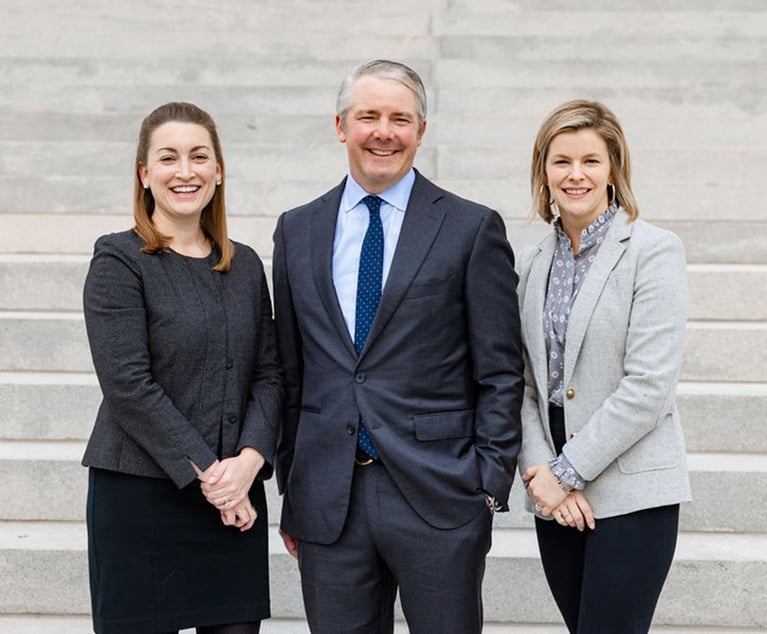FedEx Must Hand Over Emails to EEOC in Deaf Discrimination Lawsuit
A federal judge has ordered FedEx to produce emails it claims were too vast in number to retrieve in a deaf and hard-of-hearing discrimination case brought against the shipping company by the U.S. Equal Employment Opportunity Commission.
March 22, 2018 at 02:27 PM
3 minute read

A federal judge has ordered FedEx to produce emails it claims were too vast in number to retrieve in a deaf and hard-of-hearing discrimination case brought against the shipping company by the U.S. Equal Employment Opportunity Commission.
FedEx is accused of exhibiting bias against its deaf and hard-of-hearing package handlers and job applicants across the country.
U.S. District Judge Mark Hornak of the Western District of Pennsylvania denied FedEx's motion to preclude discovery. FedEx had argued that it was unreasonable to be expected to search through hundreds of thousands of emails. Additionally, the company said that if it has to produce the emails, the EEOC should pay the resulting costs.
However, Hornak said FedEx went out of its way to determine that the request for electronically stored information (ESI) was unreasonable.
“After its review of the extensive materials in what appears to the court to be a relatively straightforward discovery dispute, the court concludes that the EEOC's requested ESI from FedEx fits within the limits and scope of discovery that the Federal Rules of Civil Procedure say should be permitted in this case,” Hornak wrote in his opinion.
“FedEx reportedly went to great lengths (and expense) to demonstrate that the EEOC's requests were 'unreasonable,'” he continued, “based on the magnitude of the search results they yielded, but even when the court considers FedEx's own statistics-based arguments, it concludes that the EEOC's requested discovery remains 'relevant to [its] claim or defense and proportional to the needs of the case, considering the importance of the issues at stake in the action, the amount in controversy, the parties' relative access to relevant information, the parties' resources, the importance of the discovery in resolving the issues, and whether the burden or expense of the proposed discovery outweighs its likely benefit.'”
FedEx also argued the materials requested were irrelevant.
“The court agrees with the EEOC that FedEx incorrectly attempts to frame relevancy as a binary test where information is either irrelevant or a 'smoking gun.' After review of the EEOC's email discovery request, it strikes the court as within the much more encompassing target of what would reasonably lead to the discovery of information relevant to the EEOC's claims or FedEx's defenses,” Hornak said.
The judge also rejected FedEx's argument that it should not be expected to spend the time and money to sift through a starting pool of roughly 363,000 emails because only a fraction of that number is properly discoverable.
“From 'Day One,' the parties have been of the view that they believe this is a big case. On that, the court takes them at their word. But, part and parcel of that reality is that in big cases, there will likely be large amounts of potentially discoverable information, which means, for better or worse, a lot of work in identifying and producing it. At the end of that process, there still will (not surprisingly) be a lot of information that will become the grist of the litigation mill. That is apparently the case here,” Hornak said.
Christina Kepplinger Johansen of FedEx's legal department did not respond to a request for comment. Debra M. Lawrence of the EEOC declined to comment.
In a statement, a FedEx spokeswoman said, “FedEx Ground will comply with the court's decision on this procedural discovery question, and remains confident in defending the EEOC's claims as the case proceeds.”
This content has been archived. It is available through our partners, LexisNexis® and Bloomberg Law.
To view this content, please continue to their sites.
Not a Lexis Subscriber?
Subscribe Now
Not a Bloomberg Law Subscriber?
Subscribe Now
NOT FOR REPRINT
© 2025 ALM Global, LLC, All Rights Reserved. Request academic re-use from www.copyright.com. All other uses, submit a request to [email protected]. For more information visit Asset & Logo Licensing.
You Might Like
View All

'Taking the Best' of Both Firms, Ballard Spahr and Lane Powell Officially Merge
6 minute read

Trending Stories
Who Got The Work
Michael G. Bongiorno, Andrew Scott Dulberg and Elizabeth E. Driscoll from Wilmer Cutler Pickering Hale and Dorr have stepped in to represent Symbotic Inc., an A.I.-enabled technology platform that focuses on increasing supply chain efficiency, and other defendants in a pending shareholder derivative lawsuit. The case, filed Oct. 2 in Massachusetts District Court by the Brown Law Firm on behalf of Stephen Austen, accuses certain officers and directors of misleading investors in regard to Symbotic's potential for margin growth by failing to disclose that the company was not equipped to timely deploy its systems or manage expenses through project delays. The case, assigned to U.S. District Judge Nathaniel M. Gorton, is 1:24-cv-12522, Austen v. Cohen et al.
Who Got The Work
Edmund Polubinski and Marie Killmond of Davis Polk & Wardwell have entered appearances for data platform software development company MongoDB and other defendants in a pending shareholder derivative lawsuit. The action, filed Oct. 7 in New York Southern District Court by the Brown Law Firm, accuses the company's directors and/or officers of falsely expressing confidence in the company’s restructuring of its sales incentive plan and downplaying the severity of decreases in its upfront commitments. The case is 1:24-cv-07594, Roy v. Ittycheria et al.
Who Got The Work
Amy O. Bruchs and Kurt F. Ellison of Michael Best & Friedrich have entered appearances for Epic Systems Corp. in a pending employment discrimination lawsuit. The suit was filed Sept. 7 in Wisconsin Western District Court by Levine Eisberner LLC and Siri & Glimstad on behalf of a project manager who claims that he was wrongfully terminated after applying for a religious exemption to the defendant's COVID-19 vaccine mandate. The case, assigned to U.S. Magistrate Judge Anita Marie Boor, is 3:24-cv-00630, Secker, Nathan v. Epic Systems Corporation.
Who Got The Work
David X. Sullivan, Thomas J. Finn and Gregory A. Hall from McCarter & English have entered appearances for Sunrun Installation Services in a pending civil rights lawsuit. The complaint was filed Sept. 4 in Connecticut District Court by attorney Robert M. Berke on behalf of former employee George Edward Steins, who was arrested and charged with employing an unregistered home improvement salesperson. The complaint alleges that had Sunrun informed the Connecticut Department of Consumer Protection that the plaintiff's employment had ended in 2017 and that he no longer held Sunrun's home improvement contractor license, he would not have been hit with charges, which were dismissed in May 2024. The case, assigned to U.S. District Judge Jeffrey A. Meyer, is 3:24-cv-01423, Steins v. Sunrun, Inc. et al.
Who Got The Work
Greenberg Traurig shareholder Joshua L. Raskin has entered an appearance for boohoo.com UK Ltd. in a pending patent infringement lawsuit. The suit, filed Sept. 3 in Texas Eastern District Court by Rozier Hardt McDonough on behalf of Alto Dynamics, asserts five patents related to an online shopping platform. The case, assigned to U.S. District Judge Rodney Gilstrap, is 2:24-cv-00719, Alto Dynamics, LLC v. boohoo.com UK Limited.
Featured Firms
Law Offices of Gary Martin Hays & Associates, P.C.
(470) 294-1674
Law Offices of Mark E. Salomone
(857) 444-6468
Smith & Hassler
(713) 739-1250





